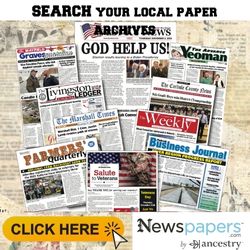Julian Morton Carroll proved that it is possible for anyone, "even a poor farm boy from western Kentucky," to live their America Dream. As a teenager his dream was to be governor of Kentucky, and he overcame odds to achieve that goal with hard work, determination, a positive attitude, faith in God, an evangelistic personality and inspiration from a famous Paducah politician.
Carroll, a native of the West Paducah in McCracken County, died Sunday in Frankfort at the age of 92. He dedicated his life to public service, highlighted by his tenure as Kentucky's 54th governor from 1974-79. He also served as a state representative from Paducah (1962-71), Speaker of the House (1968-70), lieutenant governor and president of the Senate (1972-74) and state senator from Frankfort (2004-2020). He's the only Kentuckian to hold all of those offices.
I first met Julian in 1971 when I was a student at Murray State University working for the college newspaper and he was running for lieutenant governor. He was very engaging with the students, even though some of them couldn't vote for him because they weren't from Kentucky.
I interviewed him many times as a reporter for The Paducah Sun and got to know him pretty well, not just as an elected official but on a personal basis. In later years, I visited with him in Frankfort and called him every April 16 to wish him a happy birthday.
He was one of the state's most successful governors. His accomplishments ranged from increasing funding for education to ending corruption in the bail bonding industry, supporting economic development, improving the state park system, reforming the judicial system and promoting the state's coal industry. He reformed the building and fire codes after a fire in northern Kentucky nightclub killed 165 people and injured more than 200. He also improved mine safety laws after two coal mining disasters in eastern Kentucky took a couple dozen lives.
Helping his often-neglected home area of Paducah and western Kentucky was a priority. He provided funds for a convention center, accelerated funding to complete construction of Interstate 24 two years ahead of schedule, funded development of the Paducah Riverport, created a new state park in Lyon County, funded the four-lane I-24 loop through downtown Paducah, built four-laned highways in the region and built a new vocational school in Paducah.
He had a lot to overcome on his path to the state's highest office:
• He was the son of a poor sharecropper farmer and one of 11 children. He had to live with his grandmother for several years because his father had a difficult time supporting the family.
• He married Charlann Harting, his high school sweetheart, just a year after they both graduated from high school and had to work a couple of jobs to support his family and pay for his college education, including a law degree.
• He was from rural far western Kentucky which lacked the political clout of more populated areas. The state's big city newspapers didn't pay much attention to elected officials from rural areas. No one from the Purchase area had ever been elected governor.
While some may have looked at the obstacles and given up their dream, not Julian Carroll. He often said that those were positive experiences that motivated him to follow his dream. He said he learned the value of hard work, getting an education, the importance of family, serving God and having a positive attitude.
But he was also motivated by another Paducah political hero, Alben W. Barkley, who, like Carroll, was the son of a poor tenant farmer. Barkley was elected to the U.S. House and Senate, was Senate majority leader for 10 years and was vice president from 1949-1953 during the term of President Harry Truman.
Barkley was at the height of his political career when Carroll was laying the groundwork for his. Carroll followed Barkley's career and visited him in Washington and during his visits to Paducah. It gave him inspiration.
Julian began to hone his leadership skills in his early teens. He was a leader at Heath School, which at the time housed all 12 grades. He was the first to volunteer and was involved in every school organization, including serving as editor of the yearbook and the school newspaper, president of the debate club, played basketball, sang in the Glee Club and in his senior year was elected president of the student government.
His reputation and work ethic earned him the nickname of "Boo" after Boostrum, who at the time a popular comic-strip character with a muscular physique and a determination to be somebody. Carroll wasn't offended by the nickname and saw it as his identity.
It's a nickname that his father, Buster Carroll, continued to use as an adult to remind Julian of his humble roots. I attended a Carroll family reunion when Julian was governor. One of his privileges as governor was to cut in front of food lines to get a meal at public events. At the family reunion, Julian cut in at the front of the line, but was rebuked by Buster. "Son, you may think you are somebody important when your outside of this room, but here you are just Boo, now get to the back of the line."
A major milestone to his path to the governor's office took place in the summer of 1949 when he was a delegate to Boys' State, a civics program sponsored by the American Legion to teach future leaders about government and politics. At the convention, he organized his first political campaign and was elected governor by his fellow delegates. It was quite an accomplishment since the majority of the participants were from populated areas around Lexington and Louisville.
Boys' State whet his appetite for politics and public service. As part of the program, the delegates visited the State Capitol, and he got to tour the governor's office. He sat in the governor's chair and told those around him that the next time he sits in the chair it would be as governor.
After graduating in 1950, he attended Paducah Junior College and the University of Kentucky where he obtained a law degree. After serving three years in the Air Force, he returned to Paducah in 1960 to begin a law practice.
Community leaders immediately recruited Carroll to lead a drive to lower electricity rates in Paducah by switching from power supplied by Kentucky Utilities to power supplied by the Tennessee Valley Authority. He organized a successful campaign and voters by a 3-1 margin approved a referendum that enabled the city to buy the system from Kentucky Utilities.
It established him as a young, popular community leader. Building on the positive publicity, he ran for the state house in 1961 and easily won a two-year term as a Democrat. He was easily elected to four more terms. In 1968 and 1970, he was elected Speaker of the House by his colleagues.
As House speaker, Carroll initiated rules changes to improve the decorum on the House floor and give lawmakers independence from governors, who in the past had dominated the legislature.
In 1971, Carroll was ready to take the next step on his political ladder and run for lieutenant governor. Carroll didn't have access to funds to finance a campaign until he got a boost from former Governor Bert Combs, who was mounting a comeback. Combs solicited Carroll to be part of a ticket because he thought it would help him gain support in western Kentucky. Combs said he'd raise the money to finance the campaign. Ironically, Combs lost the Democratic primary to Wendell Ford, but Carroll won the nomination for lieutenant governor.
Carroll became governor in December 1974 after Ford was elected to the U.S. Senate. The next year, he ran as an incumbent and although he was considered the runaway favorite, he campaigned hard. He traveled the state mostly by car and would make as many as 10 campaign stops a day, shaking hands, talking one-on-one and giving stump speeches.
He speculated that he shook hands with at least half of the people in Kentucky. I recall him showing me his right hand and it was red and swollen. "It really hurts," he told me.
He easily won the general election over Robert Gable by nearly 200,000 votes, which at the time was the widest margin of any governor. At age 45, he was the youngest person at that time to ever be elected governor.
Carroll's 14 years of experience as a legislator and lieutenant governor prepared him to run the state. He had more knowledge about the inner workings of state government than any governor before him or any governor since. He didn't need a task force, consultant or committee to advise him on what needed to be done to improve the state.
After listening to one of his detailed budget explanations, one observer said Carroll was so knowledgeable about the budget that he could tell you how much gasoline a state trooper's car would use in a year.
His agenda was approved with little resistance from legislators. Each day, they would get a sheet of paper from his office listing bills that he wanted passed and those that he wanted defeated. If a wayward legislator would try to sabotage one of his pet projects, Carroll would call them to his office and "explain it to them." The explanation was that if they worked to kill his bill, their favorite bill would not be approved, and their projects would not be funded.
Unfortunately, the final year of his governorship was marred by allegations of corruption in the form of an insurance kickback scheme that was investigated by the FBI. Carroll was never charged, but two of his top aides spent time in prison.
When his term ended, he stayed in Frankfort where he practiced law and worked as a lobbyist. He attempted a political comeback and ran for governor again in 1987. However, he finished fifth in the Democratic primary.
However, he was successful in his second attempt to return to politics in 2004 when he was elected state senator representing Frankfort and a portion of Fayette County. As a senator, he became a self-described elder statesman, often giving fiery floor speeches that offered advice for his fellow senators based on his past experiences.
Carroll's legacy is making improvements to the foundation of state government, especially in education. He changed the funding formula so that all school systems were funded based on enrollment. He increased teacher salaries and implemented a program where the state would fund improvements in school facilities. He provided free textbooks, eliminated student fees and created a statewide kindergarten system.
Julian's legacy is mostly forgotten. Those who understood and benefited from his leadership and accomplishments are long gone. But his accomplishments were many and Kentucky is a much better state because of his public service.
Well done my good and faithful servant. Thanks for sharing your wisdom.
Bill Bartleman was a reporter for the Paducah Sun for 39 years covering government and politics. He retired in 2010 and currently serves as a McCracken County commissioner. He can be contacted a bartleman@paducah.com.











